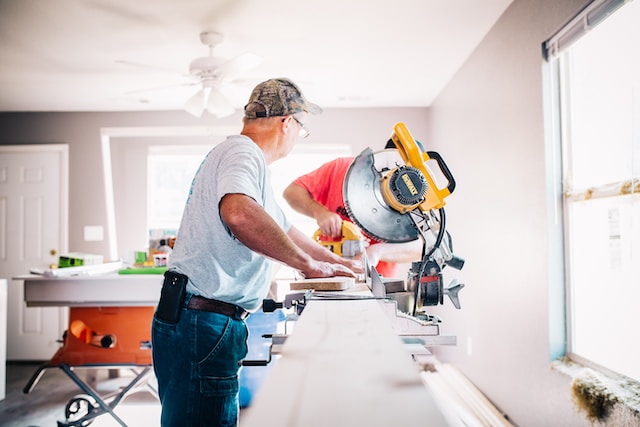It’s essential to keep in mind that accidents in the home can happen at any time and that safety should be our priority. Taking into account the different factors that can cause a fire is the only way to guarantee that we live in a safe environment. At the same time, it is crucial to know the procedures to follow if an incident like this occurs. That said, we’ve rounded up expert advice from professionals that offered some general rules to have in mind in case of a fire and valuable safety tips that will help you prevent accidents.
How to Prepare Your Home for Wildfires?
“You don’t have to go to extremes to keep your house safe from wildfires. Keep your lawn mowed and maintained. Prune low-hanging tree branches to keep limbs out of the reach of ground fire. Remove flammable materials away from your house, like old paint cans, firewood, and spare propane tanks. With just a little work you can protect your home and family from wildfires.”
Mississippi Forestry Commission
What is the best way to teach kids about fire safety and have them prepared in case of an emergency?
“The best way to teach kids about fire safety is to integrate it into their lives through education early in their childhood. What they learn at each age level is dependent on them being old enough to absorb the information and utilize it. There are so many age-appropriate programs that start at the preschool age and go through adolescence. Kids grasp a concept early in their lives, so teaching them simple safety lessons such as “get low and go”, and “stop, drop & roll” at an early age appear to stick with them for years to come.
As they grow in years, practicing fire drills, learning kitchen safety tips, match and lighter safety, learn not to burn, and many, many other educational tools are available to teach them. There are even apps and media games that teach these concepts. So, while there is no one definitive approach, education and consistency with the safety message is the key.”
N.C. Department of Insurance/ Office of State Fire Marshall
What are the biggest fire risks at home and how to prevent them?
“From years of working with property management companies, we know the biggest fire risks are in kitchens. That’s why it’s important for housing communities to have inspections that include time-stamped photos and ratings that generate work orders. These help you check appliance conditions, ensure burners are functional, and spot signs of potential fires like stovetop burn marks. Should fires happen, it’s essential to have working smoke detectors and clear paths of egress.”
How to properly implement fire safety in the kitchen?
“Some of the educational aspects of kitchen safety include being attentive while cooking. There are many distractions that take our attention away from the stove while we are cooking. Cell phones are known to be a distraction for drivers, but they are also a distraction while cooking. Pet and child safety are also a concern while cooking, so we always urge citizens to make sure all pot handles are turned inward over the stovetop.”
What are the most common causes of fire during colder weather, and how to prevent them?
“The cold weather season poses increased risks for home fires due to several factors. In addition to cooking, the extended use of candles and heating equipment are among the top contributors to cold weather fires. To prevent these from occurring, take the following simple precautions. Never leave cooking vessels unattended. If a fire happens to occur, your immediate intervention can make a difference. Keep combustibles at least 3 feet away from heat sources like candles and space heaters, as fires can spread without direct flame contact via radiant or conductive heat.
Ensure portable space heaters are UL listed and equipped with tip-over protection. If you have a chimney in your home, make sure it is inspected and serviced regularly, preventative maintenance is key.”
How to correctly use and store a fire extinguisher?
“How to correctly use a fire extinguisher: P.A.S.S. is an acronym used to explain the basics of using a stored pressure extinguisher. P = Pull, A = Aim, S = Squeeze, S = Sweep, so pull the pin, aim the nozzle at the base of the fire, squeeze the handle and sweep the agent stream back and forth, aiming at the base of the fire until it goes out.
How to correctly store a fire extinguisher: Extinguishers should be hung in plain view and an area of easy access.”
How to prepare your fire protection systems for each season?
“Most fire protection systems are of two types: wet-pipe sprinkler (system filled with water under pressure) or dry-pipe sprinkler (system filled with compressed air). Dry-pipe systems are utilized where a system is exposed to freezing temperatures. There is a danger of the system being damaged or rendered inoperable due to frozen water in the pipe. As a result, protection from freezing temperatures is the number one concern regarding seasonal preparation. Where a wet-pipe system is employed, you should ensure that all areas of the structure are heated and protected against freezing temperatures.
For a dry-pipe system, it is critical to ensure that the compressed air is maintained and low point drains are regularly exercised to remove any condensation or residual water that may be present in the system. Working with a professional that understands these differences and the steps to winterize properly is essential.”
How to prevent smoke inhalation?
”Smoke and heat rise, so remaining low to the ground allows a person to breathe the fresher air and allows you to crawl out safely. Most fire victims are found in their bedrooms sleeping. A closed door to the bedroom allows a barrier between the rest of the house during a time when we are most vulnerable – night sleeping. During a fire emergency, you have minutes to escape; having working smoke detectors installed on every level of your home, including attics, basements, and every bedroom, will help alert you quickly to danger.”
What is the essential fire safety equipment to keep in your home?
“Informal Settlement – We encourage the community to have a bucket full of sand and another one with water.
Formal Settlement – The can have a Dry Chemical Powder Fire Extinguisher and Fire Blanket.
All the above members of the community must know how to use the equipment.”
How do I check fire extinguishers?
“A correctly maintained, safely, and conveniently stored fire extinguisher can not only buy you time if a fire occurs, but it can also save lives. Carrying out routine fire extinguisher checks using the following steps can ensure that your workplace is prepared for such an event. Keep your fire extinguisher visible and easy to access: in the event of a workplace fire, fire extinguishers should be visible and accessible, so ensure they are easily located, with the instructions facing outwards, and that there are no obstacles in front of the extinguisher, allowing for immediate use in an emergency.
Check for damage and missing parts: the next part of the inspection concerns checking for any signs of physical damage (including corrosion, leakage, or a broken tamper seal) as well as replacing any missing or expired parts, such as service tags, and, finally, checking that the pressure gauge is in the correct range or position, which is indicated by a green mark on the gauge. Now that you can consider your fire extinguisher inspection completed, Flexebee training specialists recommend making sure that your designated person or fire marshal carries out these checks on a monthly basis, but also have an annual inspection conducted by a qualified engineer.”
How does brick fences protect your home
“Brick walls are extraordinarily strong and provide sheer endurance. As bricks can sustain extremely high temperatures because of their thickness, they are very much fire-resistant and help you keep your house and your assets safe.”
Learn more about trending articles on limericknewswire.com
How to use dehumidifier technology to prevent fire risk?
“Compressor dehumidifiers contain a feature called Auto Defrost that stops the dehumidifier from operating when the temperature gets too cold. When the cooling coil of a compressor dehumidifier gets too cold it can’t extract any moisture from the air. Once this occurs auto defrost stops the unit from operating until the coil warms up a little and sufficient moisture extraction is possible. If there was no auto defrost feature the dehumidifier would just keep on running while not extracting any moisture which could possibly lead the dehumidifier to overheat.
Also if the dehumidifier were to keep operating with frozen coils then those coils would have a much shorter life span. When buying a compressor dehumidifier make sure that it contains the Auto Defrost feature.”
What are the most common things people forget when elaborating a fire escape plan at home?
“I think the best answer to that is time, or exactly how long it will take them to achieve actions necessary for a quick escape. For example – How long will it take to get out of a smoke-filled environment quickly? Time each identified action to see how long it takes. This relates to how many members of the household are involved, including pets. Lives are lost when people try to go back to save loved ones. Identify the quick route and then have an alternative route out as well and make sure that there are no obstacles in the way that could trip up people.
Do you need keys to open any doors? If so leave keys in locks. Identify a safe place outside where everyone can meet – and stick to the plan. Hold family meetings on a regular basis and go over the plan. Setting up a schedule for testing smoke alarms – and you can now get heat detectors placed in kitchens, garages, and laundries. Don’t assume someone in the family does this – nominate someone and check. Set a reminder in your calendar each month, so you don’t forget.”
From wildfire prevention and safeguarding your kitchen to early fire safety education for children, these expert tips will help you create a secure living environment. Having a home security system can give you peace of mind when you are not home, and notify you if there is a fire emergency. Be aware of potential dangers and empower yourself to safeguard your home and your family from potential fire hazards.




